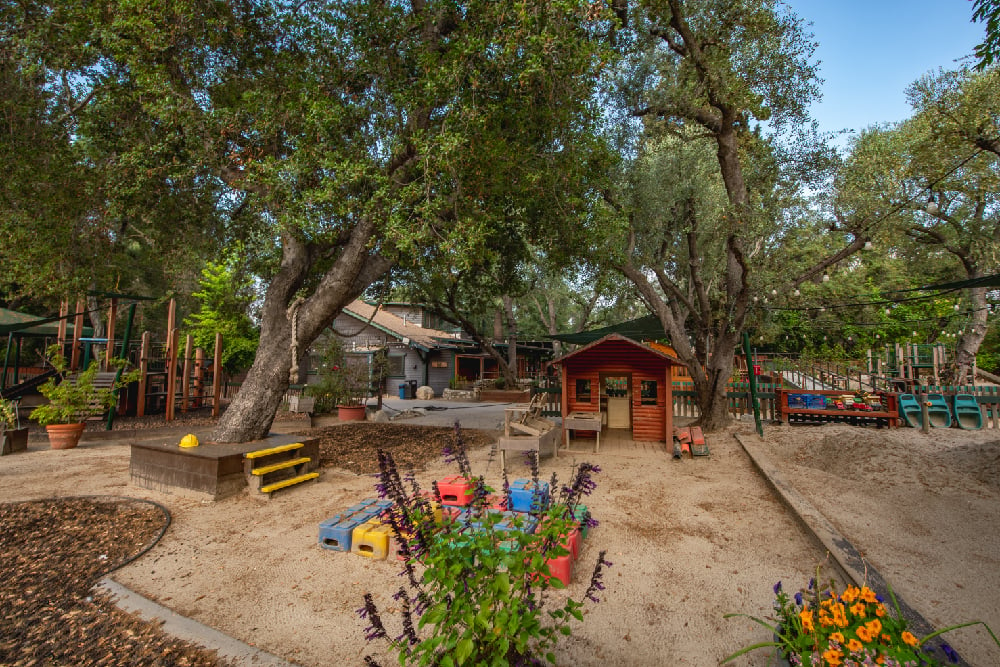
The Children’s School has thrived as a progressive beacon of early childhood education because of our devotion to our mission and values. The following pillars influence every part of our classrooms—indoor and out—and every child and family that joins our community.
Responsive Curriculum
Learning is most potent when it is personally meaningful to children, and so we begin with them. We co-create the curriculum with children; therefore, it changes each year. We are committed to teaching in ways that invite curiosity and cultivate creativity by responding to and building upon children’s questions, interests, and ideas. We believe in providing abundant opportunities for experiential learning, and we proudly employ a progressive educational philosophy inspired by educational pioneers like John Dewey.
At Pacific Oaks Children’s School, we believe learning is an active, dynamic, social, and active process.
Playful Learning
Exploration and play are primary modes of early learning. Through play, children inquire, investigate, develop theories, test, and expand their thinking in a playful application of the scientific method.
Children learn through direct experiences with materials, people, and events—and then reflecting on those experiences. Like scientists, children build theories about cause and effect and how the world works. Then they test these theories and over time develop increasingly more complete and sophisticated understandings. Teachers are on hand to prompt critical and creative thinking.
We believe that joy and playful learning are worthy educational goals for young children as they contribute to a strong foundation for a lifetime of curiosity and learning.
Respect That Is Deep and Abiding
Respect is evident in all that we do. We deeply respect children and their particular pace of learning in the early years, and that shows in the way we teach. Children make choices and decisions throughout the day. This is fundamental to a child’s developing sense of competence and confidence as respected participants in the classroom. They learn to manage themselves as they move from choice time to group time, from self-initiated to teacher-initiated activities. Self-regulation and learning to adapt to the needs of the situation is foundational to being an effective learner. Respect is also evident in our approach to resolving conflicts and how we regard differences of all kinds.
When children make choices, they encounter obstacles from time to time. We encourage children to describe the problem and generate their own solutions, and in the process, children gradually begin to develop a sense of agency.
A disagreement with a classmate is an opportunity to learn how to deal with issues constructively. Children learn to resolve problems through practice and guidance so that they can navigate conflicts with increasing independence and skill.
Equity, Empathy, Humility
A diverse and inclusive community that offers varied perspectives is important to deep learning and real-world preparation. Steeped in the legacies of our Quaker roots and the groundbreaking anti-bias work at Pacific Oaks College, our commitment to equity, empathy, social justice, and cultural awareness is unwavering. Our anti-bias approach supports children in valuing who they are as individuals and, at the same time, respecting differences in others—gender, family makeup, cultures, and more.
The spirit of social equity is not only evident in our programs, but woven into how we speak with children, the books we read, and the materials we have on hand in the classroom. As questions and issues arise, teachers take the time to talk with children about differences and fairness in age-appropriate ways.
Children apply their developing sense of right and wrong to think critically about these things. Our goal is to cultivate understanding of fairness and equity. Our differences are part of what makes us interesting and unique, and they are to be respected as every child is valued. Children have opportunities to be advocates and take action on behalf of others. We want children to be at home in a diverse world, to recognize stereotypes and bias, and to take constructive action in the face of disrespect and injustice.
Relationships and Community
Community is made up of a web of relationships, and the quality of relationships among children, teachers, and families is essential to a transformative educational experience. Good teaching and learning hinges on caring relationships. When we feel understood, engaged, and respected, we are safe to take risks, try new things, and make mistakes—essential to transformative learning—and children develop a sense of responsibility to the group.
